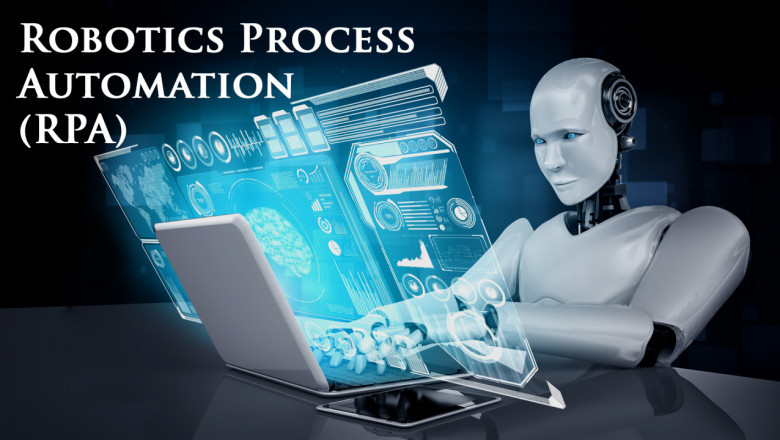views
Today’s organizations struggle with complex, high-volume processes that divert attention from core business priorities. Imagine the potential if employees could focus on strategic, high-impact work instead of wasting time on repetitive, error-prone tasks, freeing up resources, reducing costs, and improving customer experience. Robotic Process Automation (RPA) offers a simple yet powerful solution. It’s one of the easiest initiatives for a CIO to approve—low-cost, high-ROI, and easy to implement. By replacing manual work with software robots, businesses gain speed, accuracy, and efficiency 24/7 while employees shift to more meaningful tasks. The result? Lower operational costs, fewer errors, and a more engaged workforce.
What is Robotic Process Automation?
Robotic Process Automation (RPA) is a technology that enables businesses to create, deploy, and manage software robots capable of mimicking human interactions with digital systems. These bots can interpret on-screen data, execute keystrokes, navigate applications, extract information, and perform predefined tasks—just like employees, but faster and without errors. Operating nonstop, they streamline operations, eliminate bottlenecks, and handle repetitive work, freeing human workers to focus on higher-value, strategic initiatives.
What Types of Processes Can RPA Automate?
Robotic Process Automation (RPA) can streamline repetitive, rule-based tasks across industries, improving efficiency and reducing errors. Here are key processes ideal for RPA:
1. Client Support
RPA tools can help you revolutionize the way you connect with your consumers. This helps to simplify and expedite the application evaluation process. Instead of forcing your employees to search for information manually, you use RPA to automate each validation of data connected with a customer profile and collect the necessary data sets, reducing the need for a person to switch between apps.
2. Sales Order
Trading activities frequently involve looking for orders, updating ERP reporting, and entering data into CRM systems. RPA may leverage client forms to automate sales activities such as order entry, invoicing, and more. Furthermore, RPA technologies assist keep your database clean, improving customer service, and inspiring your sales team to achieve higher results.
3. Invoice Processing
Day-to-day invoice processing is a tedious and time-consuming task, burdened by multiple file formats, scattered email attachments, and manual data entry. RPA eliminates this hassle by automatically locating, extracting, and processing invoices without human intervention. Since billing follows strict rules, automation can also instantly update clients on payment status, speeding up workflows while reducing errors.
4. Hiring Employees
Robotic automation is used to automatically generate and submit job offers. It also initiates workflows when an employee account is created. Additionally, companies use it to help HR teams reduce the volume of processed documents by replacing paper copies with electronic filing systems.
What are the Benefits of Robotic Process Automation?
Key Benefits of Robotic Process Automation (RPA)
1. Increased Efficiency
RPA bots work 24/7 without breaks, completing tasks faster than humans and significantly reducing turnaround time
2. Cost Savings
By automating repetitive processes, businesses can lower labor costs and reduce expenses related to manual errors and rework.
3. Improved Accuracy
Bots follow predefined rules, ensuring consistent and error-free task execution—ideal for data entry, reporting, and compliance processes.
4. Enhanced Productivity
With routine tasks automated, employees can focus on higher-value work such as strategy, innovation, and customer engagement.
5. Better Compliance
RPA maintains detailed logs of every action taken, helping organizations meet regulatory and audit requirements with ease.
6. Scalability
Automation can be quickly scaled up or down to match business needs, without the challenges of hiring or training new staff.
7. Quick Implementation
Most RPA solutions don’t require deep coding skills or system overhauls, making deployment fast and cost-effective.
8. Improved Customer Experience
Faster processing times and fewer errors lead to quicker response rates and better service delivery for customers.
Top Use Cases of Robotic Process Automation (RPA) in 2025
Top real-world RPA use cases in 2025 that are transforming industries.
1. Marketing and Lead Generation
Lead generation is a vital component of marketing. Your team adds new lead data from external sources into the CRM system. While many modern CRM platforms offer built-in data loading tools, some still require manual entry for each new lead, which increases the risk of errors. By implementing RPA, employees can quickly import data from spreadsheets, allowing them to spend more time engaging with other customers.
2. Payment statement
Processing payrolls is a challenging task for the HR team. It often involves entering large amounts of data, which can lead to errors and delays in payments. By using RPA in HR processes, employees can automate payment transactions more quickly, reduce inaccuracies, and ensure consistency of employee data across multiple systems.
3. Financial Accounting
The end of each month and quarterly periods are typically stressful for finance departments. RPA in finance analyzes past and current market trends to generate accurate forecasts of the company’s financial condition. Additionally, automated bots download monthly sales data and calculate commission fees.
4. Recruitment process
Your HR department can use automated robots to receive resumes from various platforms, assess their relevance, and filter out spam. Additionally, bots handle 80% to 90% of key hiring processes, including checking, evaluating, measuring, and adapting. This is one of the significant benefits of RPA.
Are you ready to take the next step with RPA? Alletec is here to help.
Robotic Process Automation is no longer optional—it has become a strategic necessity for businesses aiming to streamline operations and scale effectively. With Intelligent Process Automation (IPA) emerging, Alletec can support your transition from RPA to IPA, preparing you for the next phase of automation. Contact us today to begin your automation journey!






















Comments
0 comment